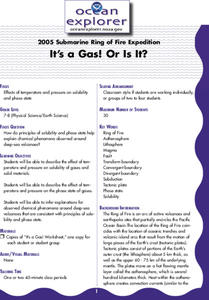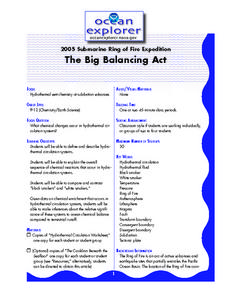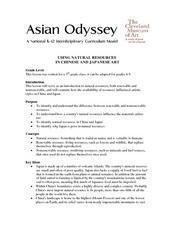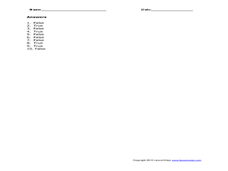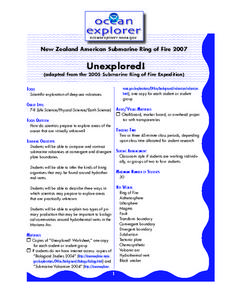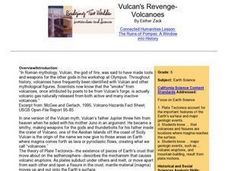Curated OER
Top to Bottom
Marine science classes read about the 2005 North Atlantic Stepping Stones Expedition and review climate change. They use maps to locate the seamount chains. In collaborative groups, they research how climate change may be altering the...
Curated OER
Geography A to Z: The Letter F
The geography letter of the day is F! The class needs to determine the answer to each of the seven clues with a world location that starts with letter F. Wonderful for a daily warm up or as an exit-card activity.
Curated OER
Volcano Tracking
Young scholars study how to track seismic activity of the Montserrat volcano. They create graphs of the data, study the observation logs that accompany the data, and interpret the graphs in relationship to the logs.
Curated OER
Life on the Ocean Floor
Why would water 2700 meters deep suddenly become warmer? Explore this and other ocean floor discoveries through this reading response worksheet. Scholars read information about the organisms discovered by Alvin, a deep-sea submersible....
Curated OER
Volcano Lesson Plans
Volcano and earthquake lessons can provide a great way to link science instruction to current events.
Curated OER
Save Your Breath
Students discuss metabolism. In this metabolism lesson, students evaluate evidence form a research report and discuss the basis for hypothetical metabolic adaptations to low-oxygen environments in the anchialine caves.
Curated OER
Japan
Second graders experience, through a hands-on approach, Japan's geography, daily life, language, foods, education, customs, art and literature. They discover all the exciting events that take place to make it really seem like they are...
Curated OER
Cruising the Mantle
Students explore the plate boundaries of the earth. Through the use of video, internet and hands-on activities, students examine the types of plate boundaries. They create a model to illustrate the movement and interaction of the...
Curated OER
Introduction to the e-Mission Operation Montserrat
High schoolers read and discuss short articles which "brief" them on the coming mission. After they read each of the articles, they discuss the main ideas and the requirements for mission training. This is an introductory lesson plan to...
Curated OER
Missouri Time Scale
Students plot events that happened years ago beginning with volcano activity. In this investigative lesson students are introduced to the different eras and plot them on a map.
Alabama Learning Exchange
Action at Plate Boundaries
Students diagram the spreading of the ocean floor. For this earth science lesson plan, students read an article on plate boundaries of the ocean. Students are expected to diagram the oceanic convergent boundary, and give a written...
Curated OER
It's a Gas! Or is it?
Learners discover the principles of solubility and phase state and their influence on chemical phenomena observed around deep-sea volcanoes. They describe the effect of temperature and pressure on solubility of gasses and solid materials.
Curated OER
It Looks Like Champagne
Students determine some practical implications of the discovery of liquid carbon dioxide in deep-ocean ecosystems. They interpret phase diagrams and explain the meaning of "critical point" and "triple point."
Curated OER
The Big Balancing Act
Students describe chemical changes occurring in hydrothermal circulation systems. They make inferences about the significance of these systems to ocean chemical balance compared to terrestrial runoff.
Curated OER
Using Natural Resources In Chinese And Japanese Art
Young scholars discuss the uses and availability of natural resources in China and Japan and how those resources effected visual art from each country. This instructional activity includes two possible enrichment activities.
Curated OER
Hawaiian Hot Spots
Students describe how plate tectonics contribute to the development of volcanoes. In this earth science lesson, students examine the map of Hawaii and explore the physical and biological environment there. They write a story about an...
Curated OER
Volcanoes
Students use the research the different types of Volcanoes. In this Earth Science instructional activity, students use provided websites to collect information about volcanoes. They work in pairs to review the different types of...
Curated OER
The Pacific Ocean
In this Pacific Ocean learning exercise, students read 2 pages about the Pacific Ocean and answer true and false questions. Students answer 10 questions.
Curated OER
Plate Tectonic - Volcanoes
Students examine how all mountains are not volcanoes by dramatizing how volcanoes erupt.
Curated OER
Volcanoes!
Learners define what a volcano is. They discover where and why volcanoes occur. They study effects of volcanoes on the Earth system.
Curated OER
Volcanoes:How Safe Are They?
Young scholars explore volcanoes, locate them on maps, record general information about volcanoes, and organize information on a fact sheet.
Curated OER
Unexplored!
Students explore volcanoes. In this deep sea volcano lesson students complete a worksheet and various activities.
Curated OER
Vulcan's Revenge-Volcanoes
Sixth graders research various types of volcanoes. They explore the various emissions that come from them. Offer some explanation why some erupt by "quietly" puring lava, while others blast out chunks of rock and clouds of ash and gases.
Curated OER
How Volcanoes Grow
Students study volcanoes including rock fragments, ash, aerosols and gases. In this volcano lesson students divide into groups and build models of the three major types of volcanoes.













